Martha Roby introduces legislation to offer veterans better resources
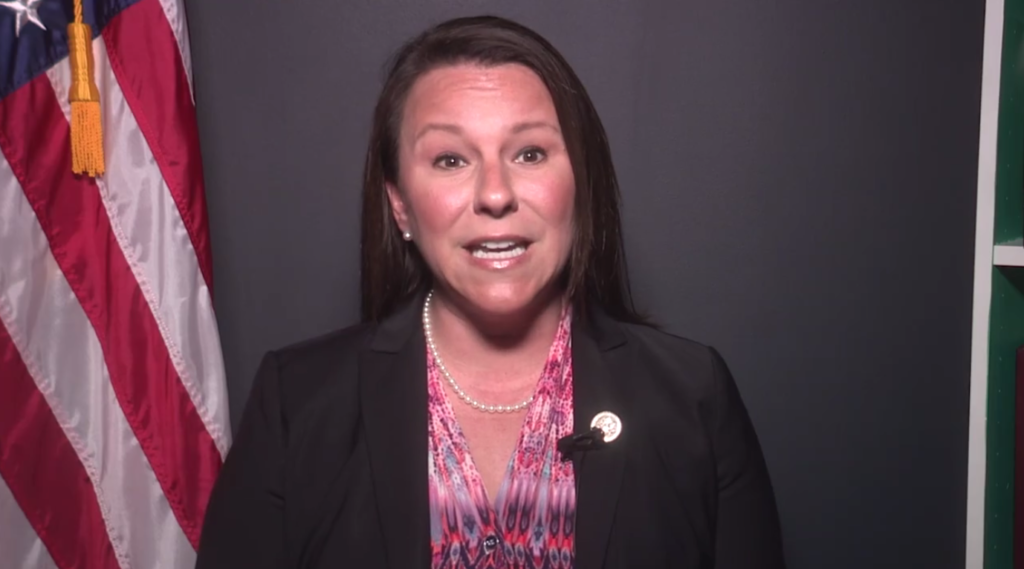
Veterans receiving mental health care and substance abuse treatment through the Department of Veterans Affairs stand to gain a powerful new ally under legislation introduced by Alabama 2nd District U.S. Rep. Martha Roby. H.R. 1712, the Protection and Advocacy for Veterans Act, would empower state and local Protection and Advocacy agencies to directly investigate the quality of mental health care and substance abuse treatment provided to veterans at the VA and allow these agencies to advocate for patients found to be receiving inadequate care. Protection and Advocacy agencies monitor the quality of state-operated hospitals, clinics, psychiatric wards, prisons, and other facilities. Their agents have the authority to inspect medical records and take legal action on behalf of patients when necessary. Roby’s bill would authorize funding for a pilot program testing the feasibility of utilizing Protection and Advocacy agencies to provide this service at the VA. “For 40 years, Protection and Advocacy agencies in Alabama and around the country have provided a critical service by monitoring the quality of care in state-operated hospitals, clinics, and other facilities,” said Roby in a news release. “I believe bringing this degree of expertise in patient advocacy to the VA would greatly benefit veterans, particularly those in need of mental health care or substance abuse treatment.” Roby continued, “In recent years, Congress has boosted funding for mental health care services and enacted legislation making it easier for the VA to attract mental health care professionals. This is a step in the right direction, but I believe we can do better. We owe it to our veterans to bring all available resources to bear to ensure access to proper treatment.” Roby’s bill has been referred to the House Committee on Veterans Affairs. Watch Roby discuss her new bill below:
First Lady helps present courage awards to 13 women

Melania Trump helped present State Department awards Wednesday to 13 women from around the globe who were recognized for demonstrating courage and leadership in the face of adversity, a group she praised a “true heroes.” The first lady, on her first visit to Cabinet department, joined Thomas Shannon, undersecretary of state for political affairs, to present the Secretary of State’s International Women of Courage Award. Secretary of State Rex Tillerson was traveling to Turkey. The award is given to women around the world who have shown courage and leadership while advocating for peace, justice, human rights, gender equality and women’s empowerment — often at personal risk. One of the honorees, Natalia Ponce de Leon, of Colombia, started a foundation to defend and protect the human rights of victims of acid attacks after a stalker doused her face and body with sulfuric acid in March 2014. Another woman, Malebogo Molefhe, of Botswana, became an advocate for female victims of gender-based violence after she was attacked, including being shot eight times, by an ex-boyfriend in 2009. She uses a wheelchair due to extensive spinal cord injuries suffered during the assault. During brief remarks, Mrs. Trump asked the audience of women and girls to imagine being any of the 13 women on the stage with her. “Ask yourself if you would have the fortitude of spirit, the courage of your convictions and the enormous inner strength required to stand up and fight against such overwhelming odds,” she said. “Amazingly, each of our honorees has courageously answered ‘Yes’ to those questions.” “These honorees, who have fought on the front lines against injustice, are true heroes,” she continued, adding that their bravery is a reminder that “there is always hope whenever the human spirit is brought to bear in the service of others.” Wednesday’s honorees hail from Bangladesh, Botswana, Colombia, the Democratic Republic of Congo, Iraq, Niger, Papua New Guinea, Peru, Sri Lanka, Syria, Turkey, Vietnam and Yemen. In April, the women will take part in a State Department-sponsored exchange program in several U.S. cities. More than 100 women from more than 60 countries have been recognized with courage awards since 2007, the department said. Mrs. Trump participation in the award ceremony amounted to a rare public appearance for her in Washington, outside of the White House. She hosted a White House luncheon for International Women’s Day earlier this month. Wednesday’s appearance fell in the middle of a busy week for the first lady in the nation’s capital. She and President Donald Trump hosted a White House reception Tuesday night for all 100 U.S. senators and their spouses. Mrs. Trump also planned a third appearance Thursday in Washington, but the White House has not released any details. Since her husband’s Jan. 20 inauguration, the first lady has lived mostly at the family’s Trump Tower penthouse in midtown Manhattan with the couple’s son, Barron, who recently turned 11. She often meets the president in Palm Beach, Florida, when he spends weekends at his waterfront estate there. Trump has said his wife and son will move to the White House after Barron’s school year ends. Republished with permission of The Associated Press.
Alabama is one of the best states to be a doctor, study shows

Doctors in Alabama are fortunate to live in one of the best states to practice medicine, according to a new study by personal finance site WalletHub. The website ranked the Yellowhammer State as the 9th best state to be a doctor in its new analysis of 2017’s Best & Worst States for Doctors. According to the study, “physician” is the most popular profession within the top 1 percent of wage earners. However, the report also noted that in 2016, the average medical-school graduate left campus with a whopping $189,000+ of debt. Given intense transformation the medical profession industry has been going through in recent years with health-care reform, the rise of branded hospital networks and the retirement of Baby Boomers, WalletHub wanted to help doctors make the most informed decisions regarding where to practice. Practicing in Alabama (1 = best, 25 = avg.): 6th: Avg. annual wage of physicians (adjusted for cost of living) 20th: Projected % of population aged 65 & older by 2030 13th: Projected number of physicians per capita by 2024 17th: Punitiveness of state medical board 28th: Malpractice award payout amount per capita 10th: Annual malpractice liability insurance rate 19th: Current competition (number of physicians per capita) In order to determine the best states for doctors WalletHub researchers looked at 14 key metrics in the 50 states and District of Columbia. The data set ranges from the average annual wage of physicians to hospitals per capita to quality of public hospital system, said the report. The top 10 states to be a doctor: Iowa Minnesota Idaho Wisconsin Kansas South Dakota Montana Mississippi Alabama Tennessee Here’s how Alabama compares to the rest of the country: Source: WalletHub
Betsy DeVos faults predecessor for wasting money on school reform
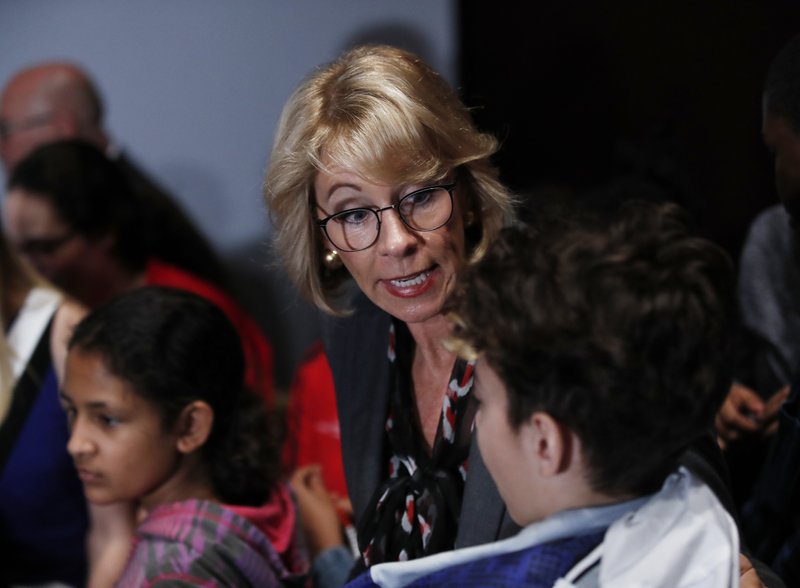
Education Secretary Betsy DeVos says her predecessor wasted billions of dollars trying to fix traditional public schools. DeVos says former Education Secretary Arne Duncan‘s signature $7 billion project targeting failing schools did not produce significant results. Therefore, she says, it is vital to give American parents the options of charter, private and other schools. She asked, “At what point do we accept the fact that throwing money at the problem isn’t the solution?” DeVos spoke Wednesday at the Brookings Institution. Asked whether school choice options also can fail, DeVos said, “I am not sure that we can deteriorate a whole lot.” During the Obama administration, high school graduation rates reached record levels but scores on standardized tests showed mixed results. Republished with permission of The Associated Press.
‘Brunch bill’ would let Alabama restaurants serve alcohol on Sunday mornings

Alabama restaurants could soon have the right to serve alcohol on Sunday mornings starting at 10 a.m. under a bill filed in the state House of Representatives. Dubbed the “brunch bill,” House Bill 353 would allow Alabama counties and municipalities the ability to give restaurants, bars and hotels in their jurisdiction the opportunity to serve alcohol for on-premise consumption two hours early on Sundays. ABC stores would remain closed on Sundays. Currently, under Alabama general statute 1992, § 4-29.1, it is illegal to purchase alcohol between 2:00 a.m. and Sunday and noontime Sunday. Introduced by Birmingham-Democrat Juandalynn Givan, the bill is currently pending a reading from the House Economic Development and Tourism Committee. 11 additional states have some variation of Sunday alcohol restrictions: Indiana, Minnesota, Mississippi, Montana, North Carolina, Oklahoma, South Carolina, Tennessee, Texas, Utah and West Virginia.
LEAP Career Day shows Alabama students anything is possible
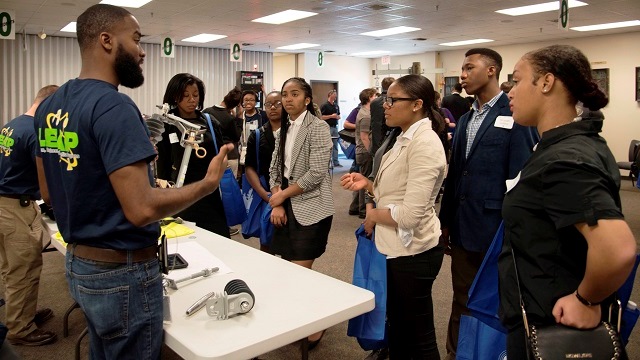
Birmingham and Gadsden-area ninth-grade students explored careers in engineering on March 23 at Alabama Power’s Linemen, Engineers and Apprentice Programs (LEAP) Career Day. Hosted at the 12th Street Crew Headquarters in downtown Birmingham, students heard speakers, participated in hands-on programs and saw firsthand some careers available to them. LEAP is a mentor program that connects Alabama Power employees with students to give them information about engineering and trade skills. It combines efforts, knowledge and experience of employees throughout Power Delivery, Transmission and Distribution departments, as well as employees in those disciplines at Southern Company Services. Alabama teens take a LEAP forward with Alabama Power career day from Alabama NewsCenter on Vimeo. While the Career Day has existed for years, this was the second year for it to follow an interactive and engaging feedback format. “Through LEAP, we participate in events both at the school and here at Alabama Power,” said Jason Pruett, an engineering supervisor for Alabama Power Power Delivery. “For this event, we bring students in and show them all of the career opportunities available to them here, from being a lineman to an engineer to all the other departments.” Dozens of employees representing their departments helped students explore careers. Engineers showcased how the company uses technology, including drones. Representatives from Environmental Affairs shared how environmental positions make an impact, as well as how students can be involved in Renew Our Rivers. In addition to an electric vehicle onsite, the Safe-T-Zone presentation was one of the many ways employees interacted with students. “I want to be an engineer but I don’t know which type, but that’s why I am here today with the LEAP program,” said Stanley Hicks, a freshman at Ramsay High School. “Engineers make a big impact in the community. I can be anything I want to be, even though I am a girl. I think it is a lot better to be here and see what my options are,” said Chloe Wenzell, a freshman at Oak Mountain High School. After last year’s program, Pruett and other organizers of Career Day were encouraged by the positive feedback and excitement from career counselors and teachers. “This is a hands-on interactive event. From all accounts, they really like it and are getting a lot out of it,” Pruett said. Republished with permission of the Alabama NewsCenter.
Honda Alabama expansion project launches with $85M first phase

Honda continues to build on its massive investment in Alabama and today announced a plan to spend an additional $85 million at its Talladega County auto manufacturing plant. The money will be used for the first of a multi-phase project to improve vehicle manufacturing flexibility, strengthen the logistic efficiency for future models and prepare for future technologies, the company said. “This significant financial investment in our Lincoln facility will enhance Honda’s manufacturing efficiency and flexibility to help us meet strong customer demand for our products and prepare us for future opportunities in our industry,” said Jeff Tomko, president of Honda Manufacturing of Alabama.It includes a building expansion at the south end of Line 1 for vehicle assembly operations. Construction for this initial phase of the project is expected to be complete in 2018. The $2.2 billion, 3.7 million-square-foot plant in Lincoln has sole responsibility for production of Honda’s Odyssey minivan, Pilot SUV and Ridgeline pickup, as well as production of the Acura MDX luxury SUV. Workers at the plant also build the V-6 engines that power each vehicle, and the facility has the capacity to produce 340,000 vehicles and engines each year. “Honda has been a powerful economic engine in Alabama, creating thousands of well-paying jobs and new levels of opportunity for residents in Talladega County and across the state,” said Greg Canfield, secretary of the Alabama Department of Commerce.Honda’s Alabama assembly center employs more than 4,500 workers and has attracted a network of almost 30 Tier One suppliers that employ an additional 7,600 people. The plant has an estimated annual economic impact on the state of $6.8 billion, according to a University of Alabama analysis. “Honda has found a home in Alabama, expanding repeatedly to boost output and add capabilities,” he added. “We’ll work hard to keep this fruitful partnership going strong.” Rising investment Earlier this year, Honda’s Alabama operations were in the spotlight at the North American International Auto Show in Detroit, where the redesigned 2018 Odyssey was unveiled. The updated Odyssey raises the stakes for family-friendly packaging, performance and technology in the minivan segment. Also in Detroit, the Alabama-made Ridgeline was named the 2017 North American Truck of the Year. The latest $85 million investment brings HMA’s total capital investment since 2011 to more than $750 million. The company has also added more than 450 employees during that time. This story originally appeared on the Alabama Department of Commerce’s Made in Alabama website. Republished with permission of Alabama NewsCenter.
Alabama Launchpad expands reach with new regional competitions

Alabama Launchpad, a program of the Economic Development Partnership of Alabama, is looking for communities that want to replicate the statewide competition on a local level. EDPA is accepting requests for proposals for the Alabama Launchpad Regional Partnership Program through Monday, April 3, and will admit two regions per year over the next five years. The reason behind the move is simple: To help more high-growth-potential companies start, stay and thrive in Alabama. “We want to create more startups, give them a better chance to be successful, connect them to investors and help them create jobs and wealth faster,” EDPA Vice President Angela Wier said. Investing in growth Alabama Launchpad already is a proven success. Since its own launch 10 years ago, the program has invested $4 million in companies that have created more than 500 jobs and gone on to raise $50 million in follow-on funding. “We want to move the statewide event to being more like a big playoff of the winners of the regionals,” Wier said. “Five years out, we’d like to be running a big ‘Shark Tank’-style annual competition and have regions across the state that would run one locally.” The new program also will provide a way for regions focused on innovation-based economic development to map existing programs that help startups and entrepreneurs and to identify gaps in local resources. It’s already been a success in the Shoals, the site of a pilot regional partnership program that recently wrapped up its first competition. Caitlin Holland, vice president of investor relations for the Shoals Chamber of Commerce, said organizers were initially concerned that they might not get many applicants, since the community is smaller than Alabama’s traditional entrepreneurial hubs of Birmingham, Huntsville and Mobile. But they were pleasantly surprised. “We were hoping to have four or five, but we ended up with nine good applicants with nine good ideas,” she said. By the time the final stage of the competition occurred late last month, that pool had been narrowed to five finalists, and they all received a portion of $97,000 in startup funding.The winners were: Alchemy, a jewelry sealer that protects skin from discoloration and irritation and also protects jewelry from tarnishing. Luxe Brand, a maker of luxury leather shoe laces. nSide, a firm that provides interior mapping of schools and other large buildings and also partners with emergency responders. Southern Swaddle, which makes baby swaddles out of fabric that comes from locally sourced products. Sycamore Physician Contracting, a website that links emergency room doctors with available shifts. Support system While the statewide Launchpad competition is typically heavy with tech firms, the Shoals contest offered more entrants in the area of fashion, Holland said. That’s not surprising, since the region is home to designer Billy Reid and clothing company Alabama Chanin, she added. More regional Launchpad competitions also will be more convenient for entrepreneurs, Wier said. For instance, in the decade-long history of the statewide competition, just three participating companies were from the Shoals. But when the region hosted its own program, that number tripled.“We were thrilled with the response. Our community really rallied around the idea of Launchpad, and we were excited to put our footprint on it,” she said. “Even the ones that didn’t win I think would tell you the experience was worth it. They found this network of entrepreneurs and others who will support them.” Ultimately, the regional partnership will deepen the reach of Launchpad, as well as support and mentoring for entrepreneurs and innovators. “The model does work,” Wier said. “It creates jobs, and it creates follow-on funding. We’re just trying to accelerate that, and the regionals should give us a way to grow it faster.” This story originally appeared on the Alabama Department of Commerce’s Made in Alabama website. Republished with permission of Alabama NewsCenter.
Jared Kushner, taking new White House role, faces rare scrutiny

Jared Kushner has been a power player able to avoid much of the harsh scrutiny that comes with working in the White House. But this week he’s found that even the president’s son-in-law takes his turn in the spotlight. In a matter of days, Kushner, a senior Trump adviser, drew headlines for leaving Washington for a ski vacation while a signature campaign promise fell apart. The White House then confirmed he had volunteered to be interviewed before the Senate intelligence committee about meetings with Russian officials. At the same time, the White House announced he’ll helm a new task force that some in the West Wing have suggested carries little real influence. Kushner became the fourth Trump associate to get entangled in the Russia probe. North Carolina Sen. Richard Burr, the chairman of the intelligence committee, said Tuesday that Kushner would likely be under oath and would submit to a “private interview” about arranging meetings with the Russian ambassador and other officials. The news came as the White House announced Kushner would lead a new White House Office of American Innovation, a task force billed as a powerful assignment for Kushner. But the task force’s true power in the White House remained unclear, according to a half-dozen West Wing officials and Kushner associates who spoke on the condition of anonymity. The official White House line is that the group would have sweeping authority to modernize government, acting as strategic consultants who can draw from experiences in the private sector — and sometimes receive input from the president himself — to fulfill campaign promises like battling opioid addiction and transforming health care for veterans. White House press secretary Sean Spicer said Monday that it would “apply the president’s ahead-of-schedule-and-under-budget mentality” to the government. But others inside and outside the White House cast doubt on the task force’s significance and reach, suggesting it was a lower priority for the administration and pointing out that similar measures have been tried by previous presidents with middling success. The assignment revived lingering questions about whether Kushner had opted to focus his time on a project that would put him at some distance from some Trump’s more conservative and controversial policy overhauls. The announcement came just days after Kushner and his wife, Ivanka Trump, were photographed on the ski slopes of Aspen, Colorado, as the GOP health care deal began to unravel amid protests from conservative Republicans that it did not go far enough in replacing President Barack Obama‘s Affordable Care Act. Kushner rushed back to Washington on Friday but it was too late to save the bill, which was scuttled hours later by House Speaker Paul Ryan. Two people close to Kushner vehemently denied the president was upset at his son-in-law for being absent, saying Trump had given the trip his blessing. And a senior White House official insisted the timing of the task force announcement was planned weeks in advance. Kushner, who has been at his father-in-law’s right hand since the campaign, has long been viewed as a first-among-equals among the disparate power centers competing for the president’s ear. Kushner, who routinely avoids interviews, draws power from his ability to access Trump at all hours, including the White House residence often off-limits to staffers. His portfolio is robust: He has been deeply involved with presidential staffing and has played the role of shadow diplomat, advising on relations with the Middle East, Canada and Mexico. Though Kushner and Ivanka Trump have been spotted with some frequency on the Washington social circuit, the president’s son-in-law is routinely in the office early and leaves late, other than on Fridays when he observes the Sabbath. While those close to Trump flatly state that Kushner, by virtue of marriage, is untouchable, this is a rare moment when he has been the center of the sort of political storm that has routinely swept up the likes of White House chief strategist Steve Bannon, chief of staff Reince Priebus and senior counselor Kellyanne Conway. It points to a White House whose power matrix is constantly in flux. Kushner has been closely allied with senior counselor Dina Powell and National Economic Council director Gary Cohn, the former Goldman Sachs executive and a registered Democrat. That group has, at times, been at odds with conservatives led by Bannon, who to this point has been the driving force behind the White House’s policy shop. When Kushner officially joined the administration in January as a senior adviser, it was suggested that the real estate heir would draw upon the private sector to streamline and modernize government. His task force has been meeting since shortly after the inauguration and started talking to CEOs from various sectors about ways to make changes to entrenched federal programs. “Jared is a visionary with an endless appetite for strategic, inventive solutions that will improve quality of life for all Americans,” said Hope Hicks, Trump’s longtime spokeswoman. A list supplied by the White House of some of those who have met with Kushner reads like a who’s who of the American business world, including Microsoft co-founder Bill Gates, Tim Cook of Apple and Jamie Dimon of JPMorgan Chase. Kushner usually does more listening than talking in the meetings, largely avoiding ideological arguments while asking questions about efficiency and best practices, according to a person who has attended a gathering but is not authorized to discuss private conversations. But the Trump team is hardly the first seeking to improve how the government operates. The Reagan administration tasked the Grace Commission in 1982 with uncovering wasteful spending and practices, while the Clinton administration sought its own reinvention of government in 1993 with what was initially called the National Performance Review. Previous commissions have not produced overwhelming results in changing the stubborn bureaucracy, casting some doubt on what Kushner’s team can accomplish. Philip Joyce, a professor of public policy at the University of Maryland, said the domestic spending cuts in Trump’s budget blueprint suggest that this new committee would most likely focus more
No LGBTQ category included in Census proposal for 2020 count

The U.S. Census Bureau is not proposing a separate count of LGBTQ Americans for its 2020 Census. The category had been sought by gay rights advocates. The bureau counts Americans according to race, gender and other characteristics. In its proposal to Congress, the people-counting agency is not asking for a separate category for LGBTQ Americans. The Census Bureau had no immediate comment. But gay rights advocates say it’s more evidence that Trump is going back on a campaign promise to protect the gay community. Last week, the Department of Health and Human Services removed questions on sexuality from two of its surveys. The Trump administration also has cancelled an Obama administration directive that students should use the bathroom that matches their gender identity. Republished with permission of The Associated Press.
Darryl Paulson: On Neil Gorsuch; both parties should just grow up!
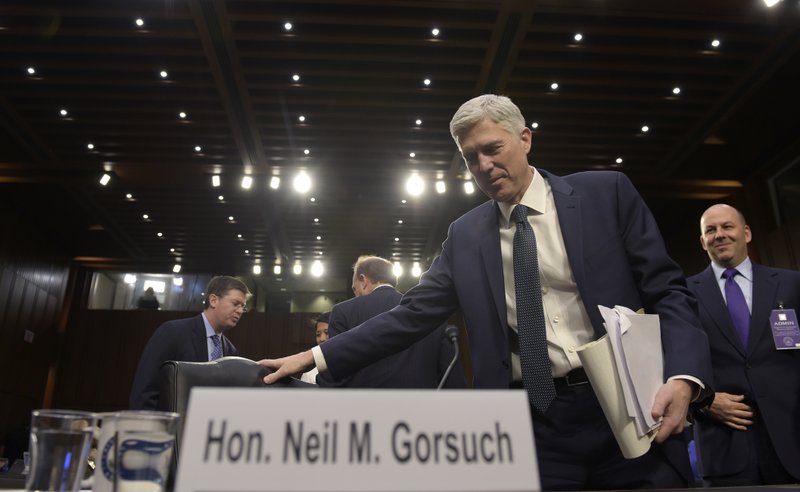
Until 1987, presidential nominees to the U.S. Supreme Court were respectfully received and reviewed by the U.S. Senate. In 1986, Antonin Scalia, a judicial conservative and constitutional originalist, was nominated by President Ronald Reagan to a vacancy on the court. He was confirmed 98 to 0 by the U.S. Senate. The confirmation process imploded in 1987 when another Reagan nominee to the court, Robert Bork, was subject to such a vicious attack concerning his record and judicial temperament, that the word “borking” became part of the political lexicon. To be “borked” was to be the subject of a public character assassination. Since the defeat of Judge Bork in 1987, the confirmation process for Supreme Court nominees has become bitter and brutal. In 2016, President Barack Obama nominated the highly-qualified jurist Merrick Garland to fill the vacancy due to the death of Scalia. The Republican-controlled Senate refused to hold hearings on the Garland nomination, arguing that it should be left to the next president. Democrats were outraged by the treatment of Garland and are taking out their anger by attempting to defeat President Donald Trump‘s nomination of Neil Gorsuch. Democrats contend that Gorsuch’s views are out of the mainstream and accuse him of favoring corporations over workers. They also argue that he fails to fully defend the right to vote and favors the “powerful candidate interests over the rights of all Americans.” Republicans respond by asking how, if Gorsuch’s views were so extreme, did he win confirmation on a 98 to 0 vote 10 years ago, when he was seated on the 10th Circuit Court of Appeals in Denver, Colorado. Would not some of those senators have opposed his extreme views when first nominated? Not only that, but the American Bar Association (ABA) told the Senate Judiciary Committee that Judge Gorsuch received its “well qualified” rating, the highest rating available from the ABA. Nancy Scott Dogan of the ABA said, “We do not give the “well qualified” rating lightly.” So, why does the ABA see Judge Gorsuch in such a different light than Democrats in the Senate? Republicans want to confirm Gorsuch for several reasons. With the death of Justice Scalia, Gorsuch would likely carry on his conservative views. For quite some time, the court has been divided between four conservatives, four liberals and the swing vote of Justice Kennedy. The Republicans and Trump also need a political victory. The Republican failure to “repeal and replace” Obamacare was a deep political blow to the party and its president. President Trump, who promised his supporters that they would “get tired of winning,” are beginning to wonder what happened to all those promised wins. Democrats want to defeat Gorsuch as political payback for the treatment of Garland, and also to make amends for Trump’s surprise victory over Hillary Clinton. In addition, Democrats want a second major defeat of Trump after he failed to secure passage of the Republican health care plan. Democratic activists do not want their elective officials to give 1 inch to the Republicans. In 2005, the “Gang of 14” senators from both parties reached an agreement to prevent an impasse over judicial nominations. The filibuster and 60 vote requirement would continue for Supreme Court nominees, but a simple majority would be needed for other nominations. Since Republican outnumber Democrats 52 to 48 in the Senate, eight Democrats must support Gorsuch for him to be confirmed. So far, no Democrat has indicated support for Gorsuch. As a result, Republican Majority Leader Mitch McConnell is threatening to use the “nuclear option.” The “nuclear option” would allow the Senate to approve a change in the filibuster rule to require a simple majority of the Senate, or 51 votes, to confirm a Supreme Court appointee. To change the filibuster rules only requires 51 votes. If Democrats are successful in their filibuster against Gorsuch, it will be the first successful filibuster of a Supreme Court nominee in over 50 years when the Senate rejected President Lyndon Johnson‘s selection of Abe Fortas to be Chief Justice. According to Republican Sen. Lindsey Graham of South Carolina, a successful Democratic filibuster would mean “that qualifications no longer matter.” A candidate unanimously confirmed to the Court of Appeals a decade ago and one who has received the highest rating from the ABA is not suitable for the court. Republican Sen. Susan Collins of Maine, one of only three senators still left who brokered the “Gang of 14” deal, is keeping the door open to use the nuclear option. As a firm believer in the rules and traditions of the Senate, Collins argues that “it would be unfair if we cannot get a straight up-or-down vote on Judge Gorsuch.” But then, it was only a year ago, that Obama and the Democrats were making the same argument on behalf of Merrick Garland. If only one of the two parties could grow up! ___ Darryl Paulson is Emeritus Professor of Government at USF St. Petersburg.
Head of Trump-Russia probe under fire, won’t step down
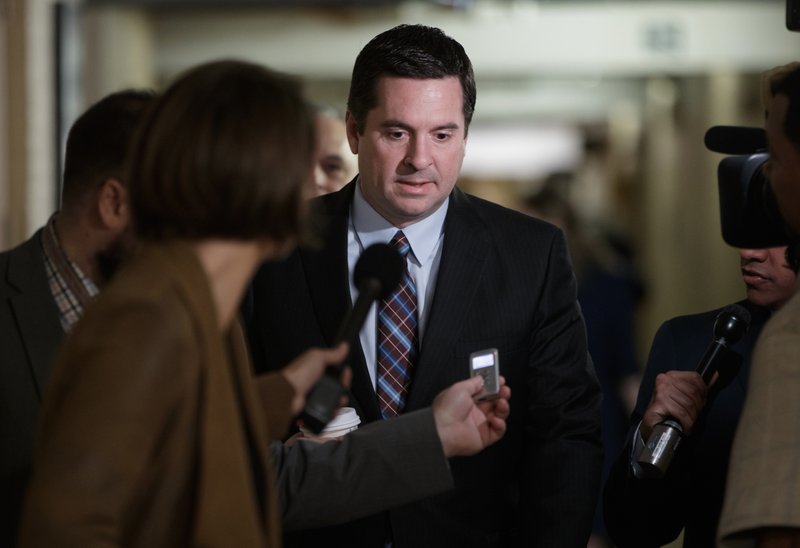
The chairman of the House intelligence committee is refusing to step away from its investigation of Russian meddling in the 2016 election, as fresh political allegations bring new cries of protest from Democrats. Asked Tuesday if he should recuse himself, committee chairman Devin Nunes responded, “Why would I?” Later in the day, the White House vehemently denied a report that it had sought to hobble the testimony of a former acting attorney general before Nunes canceled the hearing where she was to speak. President Donald Trump‘s spokesman, Sean Spicer, lashed out at reporters, claiming they’re seeing conspiracies where none exist. “If the president puts Russian salad dressing on his salad tonight, somehow that’s a Russian connection,” he suggested. The embattled House committee is conducting one of three probes into the election campaign, its aftermath and potential contacts between Trump officials and Russians. The Senate intelligence committee is doing its own investigation, and since late July the FBI has been conducting a counterintelligence investigation into Russia’s meddling and possible coordination with the Trump campaign. Nunes’ decision to cancel Tuesday’s hearing was the latest in a series of actions that Democrats contend demonstrate that his loyalty to Trump is greater than his commitment to leading an independent investigation. The California Republican, who was a member of Trump’s presidential transition team, has said he met with a secret source last week on White House grounds to review classified material that showed Trump associates’ communications had been captured in “incidental” surveillance of foreigners in November, December and January. Nunes would not name the source of the information, and his office said he did not intend to share it with other members of the committee. Nor would he disclose who invited him on the White House grounds for the meeting. He described the source as an intelligence official, not a White House official. In an interview on CNN, he suggested the president’s aides were unaware of the meeting. Trump has used Nunes’ revelations to defend his unproven claim that Barack Obama tapped phones at Trump Tower. Adding to the swirl of questions was the publication of a series of letters dated March 23 and March 24 involving a lawyer for former Acting Attorney General Sally Yates. Yates, along with former CIA Director John Brennan and former director of national intelligence James Clapper, had agreed to testify publicly before the House intelligence committee. The canceled hearing would have been the first opportunity for the public to hear Yates’ account of her role in the firing of Trump’s first national security adviser, Michael Flynn. The letters from lawyer David O’Neil, published by The Washington Post, appeared to be in response to a meeting O’Neil had at the Justice Department on March 23 in advance of the hearing. In them, O’Neil pushes back against what he says is Justice Department guidance on what Yates could say about conversations she had with Trump — conversations the department indicated could be covered by executive privilege. “We believe that the Department’s position in this regard is overbroad, incorrect, and inconsistent with the Department’s historical approach to the congressional testimony of current and former senior officials,” O’Neil wrote in a March 23 letter to Justice Department official Samuel Ramer. He also wrote that Yates’ testimony would cover details that others have publicly recounted. The Justice Department responded to O’Neil saying that the question of what privileged conversations Yates could discuss was ultimately up to the White House. Spicer on Tuesday said the White House never sought to stop her. “We have no problem with her testifying, plain and simple,” he said. O’Neil declined to comment Tuesday, and a Justice Department spokeswoman did not return a message seeking comment. Yates was fired in January as acting attorney general after she refused to defend the Trump administration’s first travel ban. She alerted the White House in January that Flynn had been misleading in his account of a December phone call with the Russian ambassador to the United States in which economic sanctions against Russia were discussed. Flynn was ousted after those discrepancies were made public. Virginia Sen. Mark Warner, the top Democrat on the Senate intelligence committee, said that White House meddling is not helping to “remove the cloud that increasingly is getting darker over the administration.” Democratic members of Nunes’ House committee said his ability to lead a bipartisan probe is compromised. “It’s irregular, to be benign about it, to have a lead investigator kibitzing with the people being investigated,” said Rep. Jim Himes, D-Conn. House Speaker Paul Ryan reiterated his support for Nunes, and Nunes himself said all of the controversy was standard for Washington. “It’s the same thing as always around this place — a lot of politics, people get heated, but I’m not going to involve myself with that,” he said. Republished with permission of The Associated Press.


